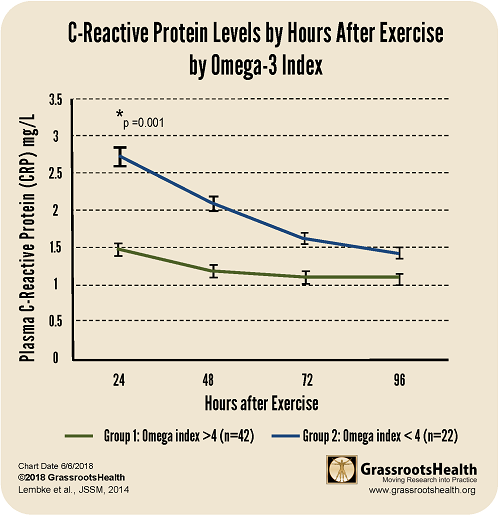A study by Lembke et al., “Influence of Omega-3 (N3) Index on Performance and Wellbeing in Young Adults after Heavy Eccentric Exercise,” compared the Omega-3 Index of subjects with the incidence of delayed onset muscle soreness (DOMS), inflammatory biomarkers, and quality of life following vigorous exercise. Plasma C-reactive protein (CRP) was measured as an indicator of inflammation at 0, 24-, 48-, 72-, and 96 hours post-exercise.
Delayed onset muscle soreness is characterized as a type of soreness that is usually caused by a new or unaccustomed exercise. The onset of DOMS generally occurs within 24-48 hours following exercise, may be associated with swelling, tenderness and discomfort, and may be experienced up to 1 week following heavy exercise.
Healthy men and women over the age of 18 who were not currently taking any dietary supplements containing fish oil or omega-3 were allowed to participate in the study. Study subjects were given either an omega-3 dietary supplement (2.7 g EPA+DHA) each day (Group 1) or a placebo each day (Group 2) with food for 30 days prior to exercise.
After 30 days of supplementation, Group 1 (N=42) moved from an initial average Omega-3 Index of 3.6 up to 5.4 as measured at the start of the exercise portion of the intervention.
After 30 days of placebo, Group 2 (N=22) moved from an initial average Omega-3 Index of 3.8 to 3.9 as measured at the start of exercise.
The results of the study were as follows:
- The measurement of DOMS (mean worst pain score) was recorded on a scale from 0 to 10. At 24 hours, the average score for Group 1 was 3.81 versus 5.32 for Group 2.
- There was a significant difference in DOMS score at 72 hours with Group 1 reporting an average of 2.19 vs 4.36 in Group 2. The difference at 96 hours was also significant with Group 1 reporting an average score of 1.63 vs 3.17 in Group 2.
- At 24 hours, the difference between the two groups in C-reactive protein level was statistically significant and there was a visible trend for lower average CRP levels in Group 1 compared to Group 2 throughout the remaining time points (see the chart below)
- Subjects in Group 1 also had lower blood lactate levels directly after exercise and reported improved overall quality of life as measured by a more stable mood at 72 hours as compared with Group 2.

What is the connection between omega-3 and inflammation?
Previous research has suggested that omega-3 supplementation may be protective against inflammatory conditions that have been linked with many chronic diseases, such as metabolic syndrome and Type 1 Diabetes.
Specific to exercise, the findings of this study “support the hypothesis that higher omega-3 tissue levels may have a protective effect on muscle cells during exercise and may act by reducing the inflammatory response and subsequent DOMS.”
